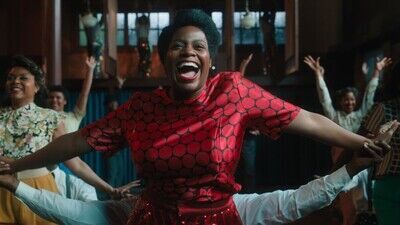When Nettie runs away, the sisters lose contact, and with no sister, no reliable family, and no children, Celie is left to trudge alone through the dispiriting decades to come. Her husband, abusive in every sense of the word, is in love with another woman, Shug Avery (Taraji P. Henson), a “fast and loose” blues singer who never stays in one place for too long. The only pieces of solace Celie finds is in the distant hope that her sister and children are alive somewhere, and in the support of Shug and Sofia (Danielle Brooks), her spunky, strong-willed daughter-in-law.
The performances in “The Color Purple” are the absolute cornerstone of the film’s successes. Mpasi and Barrino, both making their film debuts, are excellent in embodying Celie, showcasing the character’s ruminations and hesitancy, but also her aggrieved resilience. Mpasi in particular is utterly gravitational, her hypnotic smile and gripping, wordless expressions elicit chills. The chemistry between her and Bailey is on point, their bond sold with such genuine vigor that the estrangement at the film’s center remains affecting despite Nettie’s on-screen absence.
Barrino as an elder Celie is incredible as well, maintaining a sense of childhood naivety in the veneer of her performance, expertly pointing to an aged woman, yet one that has been developmentally and socially trapped on account of the tyrannical men in her life.
Brooks, Tony-nominated for her onstage depiction, is the film’s no-holds-barred knockout, giving an undeniably crowd-pleasing performance. Her charismatic presence is spellbinding, and her emotional dexterity in covering the full spectrum of affectations, from tear-jerking to side-splitting, is a joy to witness. Sofia is heralded for her refusal to be ignored, underestimated, or disrespected, and Brooks’ performance demands the same.

